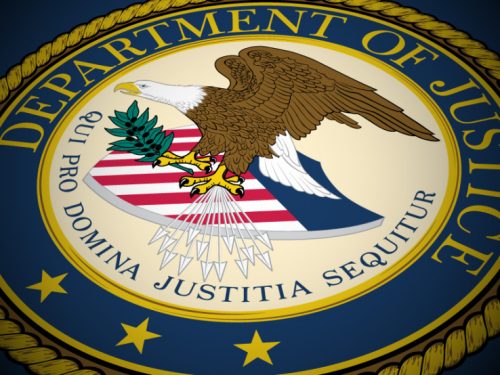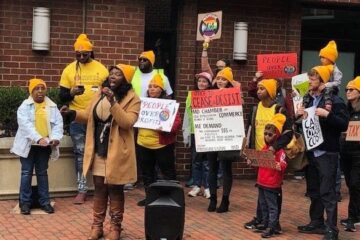They were sentenced for overseeing call centers that threatened and defrauded Spanish-speaking U.S. Consumers.
WASHINGTON – Three Peruvian men have been sentenced to significant terms of incarceration for operating a large fraud and extortion scheme, the Department of Justice announced.
The three men managed and operated call centers based in Lima and Cajamarca, Peru, which used government impersonation, lies, and threats to steal money from thousands of Spanish-speaking victims in the United States.
Earlier today, U.S. District Judge Robert N. Scola sentenced Johnny Enso Hidalgo Marchan, 40, of Lima, Peru, to 100 months in federal prison for his role overseeing one of the Peruvian call centers. In sentencing Hidalgo, Judge Scola stated that it was “important to impose a significant sentence to deter people in other countries who think they can prey on people in the U.S. with impunity.” In June 2020, Judge Scola sentenced Francesco Guerra, 25, of Lima, Peru, to 90 months in federal prison, and, in March 2020, he sentenced Rodolfo Hermoza, 45, to 88 months in prison for their roles in the scheme. The three men were extradited from Peru in December 2019 and convicted of conspiring to commit mail fraud and wire fraud earlier this year.
“We are committed to pursuing transnational criminals who defraud U.S. consumers,” said Acting Assistant Attorney General Ethan P. Davis of the Justice Department’s Civil Division. “Disrupting transnational elder fraud schemes is an Agency Priority Goal for the Department of Justice. These prison sentences show that criminals responsible for threatening and defrauding U.S. consumers will be held to account.”
“Individuals who defraud American consumers will be brought to justice, no matter where they are located,” said U.S. Attorney Fajardo Orshan of the Southern District of Florida. “Protecting the elderly and vulnerable members of our community from schemes, such as this one, is a top priority of this Office and the Department of Justice.”
“The U.S. Postal Inspection Service will continue to aggressively investigate and go after those who deprive citizens of their hard earned money through the use of threats and other abusive tactics. The results of this investigation are an example of this determination and the dedicated partnership established with the Department of Justice’s Consumer Protection Branch,” said Inspector in Charge Antonio Gomez.
As part of their guilty pleas, Hidalgo, Hermoza, and Guerra admitted that they falsely posed as attorneys affiliated with U.S. courts and government agencies in threatening victims with fines, detention, confiscation of property, deportation, and community-service requirements to obtain payments from the victims. U.S. consumers lost more than $1.5 million to the defendants’ fraud scheme.
In addition to prison time, each defendant was also ordered to serve three years’ supervised release following their terms of incarceration and to make restitution payments to victims of their scheme.
Hidalgo, Hermoza, and Guerra managed and operated Peruvian call centers that, in partnership with an entity in Miami, Florida, used Internet-based telephone calls to lie to and threaten Spanish-speaking victims in the United States. The callers often falsely accused the victims of having failed to accept delivery of certain products and claimed that the victims owed thousands of dollars in fines and that court proceedings would be brought against them. In reality, the victims—many of whom were elderly—had never ordered or received the products.
The defendants and other call center employees claimed that the consumers could resolve the supposed debts and avoid threatened consequences if they immediately paid a “settlement fee.” Consumers who contested the settlement fees were told that failure to pay could lead to harmed credit, arrest, deportation, or seizure of property.
Photo: USDOJAt Guerra’s June 2 sentencing, Judge Scola described the defendants’ crimes as a “very serious offense” and noted that they preyed on many vulnerable victims and caused lasting psychological and emotional damage to the victims of their scheme. Judge Scola stated that a significant sentence was necessary to promote respect for the law and to deter others from engaging in similar conduct.
In addition to Hidalgo, Hermoza, and Guerra, two other individuals previously were brought to justice in connection with this scheme. In 2014, charges were brought against Angeluz and Maria Luzula of Miami and Juan Alejandro Rodriguez Cuya of Lima, Peru. Luzula pleaded guilty to all counts against her midway through trial and was sentenced to 165 months in prison. Rodriguez Cuya was convicted following a two-week trial. U.S. District Court Judge Patricia A. Seitz sentenced Rodriguez Cuya to 210 months in prison. With today’s sentencing by Judge Scola, all five defendants who have been charged in connection with this large-scale fraud and extortion scheme have now been sentenced to substantial terms of imprisonment.
The case was prosecuted by Trial Attorneys Phil Toomajian and Joshua Rothman of the Department of Justice Civil Division’s Consumer Protection Branch. U.S. Postal Inspection Service’s Miami Division investigated the case. The Justice Department’s Office of International Affairs of the department’s Criminal Division, the U.S. Attorney’s Office of the Southern District of Florida, the Department of State Diplomatic Security Service, and the Peruvian National Police provided critical assistance.
Since President Trump signed the bipartisan Elder Abuse Prevention and Prosecution Act (EAPPA) into law, the Department of Justice has participated in hundreds of enforcement actions in criminal and civil cases that targeted or disproportionately affected seniors.
In January 2020, the department designated “Preventing and Disrupting Transnational Elder Fraud” as an Agency Priority Goal, one of its top four priorities. Later, in March 2020, the department announced the largest elder fraud enforcement action in American history, charging more than 400 defendants in a nationwide elder fraud sweep. The department has likewise conducted hundreds of trainings and outreach sessions across the country since the passage of the Act.
The department’s extensive and broad-based efforts to combat elder fraud seek to halt the billions of dollars senior lose to fraud schemes, including those perpetrated by transnational criminal organizations. The best method for prevention, however, is by sharing information about the various types of elder fraud schemes with relatives, friends, neighbors, and other seniors who can use that information to protect themselves.
If you or someone you know is age 60 or older and has been a victim of financial fraud, help is standing by at the National Elder Fraud Hotline: 1-833-FRAUD-11 (1-833-372-8311). This U.S. Department of Justice hotline, managed by the Office for Victims of Crime, is staffed by experienced professionals who provide personalized support to callers by assessing the needs of the victim, and identifying relevant next steps.
Case managers will identify appropriate reporting agencies, provide information to callers to assist them in reporting, connect callers directly with appropriate agencies, and provide resources and referrals, on a case-by-case basis.
Reporting is the first step. Reporting can help authorities identify those who commit fraud and reporting certain financial losses due to fraud as soon as possible can increase the likelihood of recovering losses. The hotline is staffed 7 days a week from 6:00 a.m. to 11:00 p.m. eastern time. English, Spanish and other languages are available.




